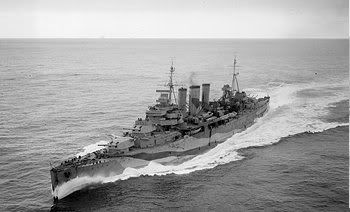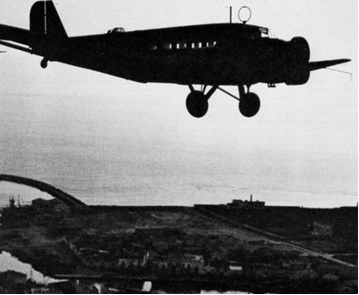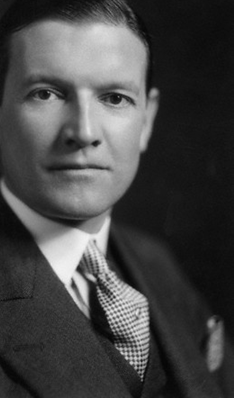Chapter 92, London, 1 October 1940
The aircraft bounced its way through the clouds, continued on over the coastline and began its descent to the aerodrome below. The German Foreign Minister, Joachim Von Ribbentrop, peered out of the small window at the tidy fields and gentle countryside below and felt the usual rush of contradictory feelings. He found the British so aloof, so arrogant, so unbelievably difficult to make a bond with; he scowled as he realised that they undoubtedly thought the same about him. Looking down at the quaint roads and eccentric villages he remembered the Fuhrer’s orders. He would not antagonise, he would give Halifax every support (the Fuhrer, Ribbentrop realised, was worried about Halifax’s prospects) and would support the new ambassador to London, who would be arriving in two days’ time.
The Ju 52 rumbled to a halt, guided in by an RAF NCO who positioned the aircraft perfectly. A small delegation presented arms as Ribbentrop clambered out of the cabin and stared dourly at the rainclouds above. Every one of his aides had advised against wearing a coat; now the heavens had opened and Ribbentrop noted the umbrellas of the welcoming dignitaries. Supressing his rage, Ribbentrop strode to take shelter.
“Herr Von Ribbentrop? Wilkommen zu Gross Britannien,” the senior official, who looked vaguely familiar, greeted him in passable German. After introducing himself as Sir Henry Channon, the Undersecretary of State for Foreign Affairs, (
ah yes, Ribbentrop realised,
Butler’s assistant) he gestured to the others in his party. Annoyed that neither Halifax nor Butler had seen fit to welcome him personally, Ribbentrop snapped.
“They insult me with this insignificant?!” He spoke in German, though in truth he did not care if Channon heard. A British official, elderly and cold looking with a carefully trimmed moustache, whispered into Channon’s ear. The Minister looked aghast.
“No Sir! Viscount Halifax and Mr Butler regret that they cannot meet you personally. Viscount Halifax is, er, with His Majesty and Mr Butler is currently receiving the Italian ambassador.”
Ribbentrop shrugged, then sensed an opportunity to turn the tables on these unwelcoming British.
“Ah yes, you seek to scare them into not seizing the Mediterranean!” A few German aides, genuinely not expecting this outburst, tried to signal discreetly that he gone too far. But he was already off, stalking past Channon and the advisor (Ribbentrop recognised him as Cadogan, a senior Foreign Office official) into the waiting car.
“Come! We go! To London, now Herr Channon!”
Wearily the British delegation followed him. Cadogan paused to observe the German delegation.

A short distance away, in Downing Street, Halifax was skim-reading through the latest news from the Foreign Office. The French rebels were still clinging on to their positions in Africa. Paris, in the wake of the mishandled raid on the fascist convoys (including, unfortunately, the attack on HMS Kent) had requested German assistance in crushing them and the Belgians (Paris, it had been rumoured, would inherit the Congo, further upsetting Mussolini who had been coveting it). Halifax quickly jotted a note to Butler to bring his concerns to Ribbentrop’s attention. Halifax quickly grew bored of illicit convoys to Africa and, cup of tea in hand, looked out over the Downing Street gardens. He felt a twinge in his belly at the thought of Ribbentrop’s being in London. It was the Italians who were really to blame. Marginalised in Milan (Halifax winced at the alliteration, finding that it sounded like a cheap newspaper headline) they had fought to insert a vague clause promising Head of Government visits (the British had recoiled in horror from a Head of State visit) between the three capitals. Both Berlin and London had agreed to make their visits at Foreign Minister level, though, much as it horrified him, Mussolini had insisted on a visit to London, which, as Halifax gazed at the rain, was now looming. He also had to contend with new ambassadors from France and Germany.
All to coincide at the same time; how I am unfortunate to have these demanding items of foreign affairs so close together. Halifax was shrewd enough to guess why; Europe had waited for the election result. With Halifax now safely in power they could attend to the diplomatic processes. There was a knock as the door, snatching him from his thoughts.
“My darling, Mr Channon is here.”
“Thank you, dear one.”
“We have to attend the Bank of England function this afternoon. I thought we could lunch together before we set off.”
Halifax smiled. His wife’s kindness was just the thing he needed. “I insist upon it.”
Channon entered, dripping wet and looking flustered. “My Lord.”
“Well, how was Herr” Halifax paused, not wanting to murder the wretched man’s name again, “how was His Excellency?”
“Ludicrously brutish as ever. He was grumpy with you for not meeting him, so I said that you were with His Majesty. And as usual he ignored the advice of his aides, or least he appeared to.”
Halifax winced; the King was quite patently in Scotland and Ribbentrop’s staff would probably know this. “Sit down, ‘Chips’. Did he give anything else away?”
“They want something, that much I can tell you. Aside from being a blustering malcontent he didn’t say anything too offensive. Warned us off the Mediterranean but didn’t say what Germany’s position on the Syrian situation actually was.”
“Your impwession?”
Channon paused, thinking. “I think they’ll want our agreement on Italian dominance of Syria and Lebanon.”
Halifax looked far from convinced. “So publicly? At the expense of their welations with Fwance?”
Channon immediately made his reply. “France has already been given every assistance. I don’t think that they would dare insult Mussolini further.” He said this in a casual, chatty way, which for some reason Halifax found tiresome.
Halifax was not so sure; France was rapidly proving an eager ally to Germany at governmental level, despite continuing resistance in some cities to the new regime. He pursed his lips. “Have you bwiefed the Foweign Secretary?”
“I have, My Lord. He will be sitting down to lunch with Ribbentrop about now.”
At that very moment the German delegation and their British counterparts sat down to a lavish lunch. It had been Cadogan’s suggestion for the two Foreign Ministers to lunch together with their staffs. Cannily knowing Ribbentrop’s love of expensive living he had ensured that the 'Palazzo' was suitably grand for the German delegation. Butler, already flagging, cursed Halifax’s evasiveness at avoiding the Germans. Cadogan, though working tirelessly to make the visit a success, had made his scepticism at the warm words of “Anglo-German cooperation” being voiced by the politicians gently noticeable.
“Tell me, Herr Butler, what is the British view of the war in Africa.”
Butler froze. After everything Channon had said he had been expecting a warning not to meddle in the Mediterranean. But now he found himself caught unawares over the French Civil War. He coughed pointedly, hoping that Cadogan would rescue him.
“Speaking for myself, I find it a disappointing affair,” Cadogan said, his eyes daring the Germans to challenge him. Butler, now alarmed that his senior civil servant was about to ruin the visit, now spluttered an interruption.
“Indeed. This French rebellion is clearly none of our business. The internal affairs of France are not the concern of His Majesty’s Government.” He said it with forced calm, and was relieved to see the satisfied Germans nodding their agreement.
Ribbentrop was about to reply, to make some flowery (and ultimately meaningless) statement thanking Butler, but Cadogan beat him to it.
“Of course, His Majesty’s Government will not accept the violation of British or Commonwealth territory, including our skies and our territorial waters, from any nation,” he said in a clipped, crisp tone. The reference to HMS Kent was clear, and Butler started, the colour draining from him as he tried to think of a way of defusing the situation. Ribbentrop, naturally, had a reply.
“Of course! And I am alarmed, Sir Alec, that you think that the Germans would do such a thing.” He laughed, mocking Cadogan who did not reply. In truth Ribbentrop was delighted. He could, though the British did not know, go home that instant; his mission was accomplished, the British had confirmed that they would not support the French rebels and would allow them to be crushed. Cadogan’s reply had been a defence of Britain’s remaining honour; she would allow the French and Belgian guerrillas to be crushed but would not allow herself or the Dominions to be violated. The French, Ribbentrop knew, had been furiously admonished for their carelessness in violating British airspace and for attacking the British flotilla. It wasn't that Berlin really cared about such things, but they had their focus on other tasks that would be easier, Goering and his faction has argued, without the British getting involved. Ribbentrop and his party knew that the Fuhrer didn’t care about Britain or her Empire, or, in truth, Africa. But the French were squealing for help and Germany would give it. Downing the excellent wine (Ribbentrop was toying with asking Butler to get him a case) Ribbentrop decided that he would enjoy this visit to London.
[Game Effect] – I’m afraid that after the election story arc you’re going to suffer a lot of diplomacy, as the long-delayed fall-out from Milan resumes in earnest. And the first diplomatic contest between Germany and Britain goes in Germany’s favour as the British show their lack of interest in the Franco-German alliance’s attempt to stifle Belgian/French resistance.
The British obsession with the Mediterranean continues, largely, I think, thanks to the personalities involved. Channon and Butler (at this stage) are committed European-centrics; the Empire and matters beyond the continent don’t really interest them. The Italian AI still hasn’t done anything vaguely warlike to Syria and Lebanon (there is a story idea as to why coming up soon) and the British assume that Ribbentrop’s visit is to get British non-intervention there agreed, opening up the possibility of a German thrust into the Balkans and beyond. Of course, Butler and Channon have read this poorly, as the Germans instead look to give old Petain a helping hand in expanding the French Empire in Africa.
Cadogan here saves the Foreign Secretary from looking an ass; he was a clever diplomat who performed well in the service of his country. Given Ribbentrop’s presence in the Capital this may be required.
Trekaddict: I have to admit that whilst I love trying to stick to what I think the personalities would have done, it sometimes gets a bit dull! Hence this sub-plot of HMS Kent.
GeneralHannibal: Not as yet – the British have had other things to worry about. But you may see some form of covert help later.
Maximus323: I know what you mean. This update was a joy to write, and a lot easier to the political ones!
Sir Humphrey: I agree Sir!
Morsky:  Enewald:
Enewald: I will, I promise, look at the leadership of the rebellion. But as I detest De Gaulle I’ll avoid him if I can.
Atlantic Friend: Liking the moustache! Essentially, after a lot of wrangling everyone has followed Halifax’s peace treaty. The super-destroyers, which the rebels were lucky to get their hands on, will be back (at least the survivors) for more daring-do!
Nathan Madien: The British are really hamstrung by Milan. They’ll probably get an apology, but you are correct that Britain will not be sailing to blow up the French.
Faeelin: I do not agree. At this stage to get involved is probably months too late. And, who would now genuinely rely on British assistance?




Or are they now a de facto puppet state, to be kicked around by the likes of Ribbentrop and Ciano as they please?
